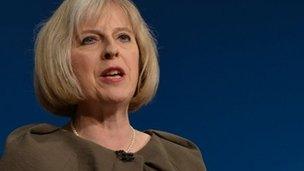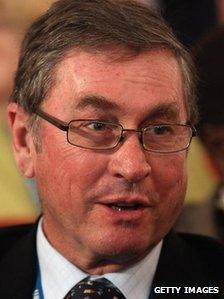Theresa May: Tories to consider leaving European Convention on Human Rights
- Published

Theresa May called for greater private sector involvement in delivering public services
The Conservatives would consider leaving the European Convention on Human Rights if they won the 2015 election, the home secretary has said.
Theresa May told an event organised by the ConservativeHome, external site the party would also scrap the Human Rights Act.
She said it restricted the UK's ability "to act in the national interest".
A private poll by ex-party treasurer Lord Ashcroft, meanwhile, suggested the party would lose 93 marginal seats to Labour if the election was held now.
The BBC understands Mrs May was putting forward ideas for the next Conservative manifesto, and such a move was not current government policy.
The home secretary said she thought David Cameron would lead the party into the next election, and BBC political correspondent Ross Hawkins said there was no sign the speech heralded a leadership challenge.
It will be widely considered as an attempt by Mrs May to position herself for any future contest, our correspondent added.
Mrs May told the gathering she was sceptical whether the convention limited human rights abuses in other countries and suggested it restricted Britain's ability to act in its own interests.
"When Strasbourg constantly moves the goalposts and prevents the deportation of dangerous men like Abu Qatada, we have to ask ourselves, to what end are we signatories to the convention?" she said.
"Are we really limiting human rights abuses in other countries? I'm sceptical."
She said that "by 2015, we'll need a plan for dealing with the European Court of Human Rights".
"And yes, I want to be clear that all options - including leaving the convention altogether - should be on the table."
She also called for greater use of the private sector in delivering public services and more state involvement in industrial planning.
The shadow home secretary Yvette Cooper accused Mrs May of a "blatant political pitch" to right-wing Tories, disillusioned with the prime minister's leadership.
"It is clear that she is more concerned about appealing to... Tory back benchers and setting out an alternative to David Cameron and George Osborne than she is about a coherent policy for Government.
"She says in her opening paragraph, 'Today's event is all about a choice of leadership,' - and its clear that today is another attempt to set out her stall".
Meanwhile Lord Ashcroft, who owns Conservative Home, published the findings of his poll during a speech earlier at the conference in London.
More than 19,000 people were questioned in 213 British constituencies in January and February 2013. The poll suggested Labour would gain 109 seats in total, returning a total of 367 MPs to parliament, a majority of 84.
It said there would be an average swing of 8% to Labour in the Conservative's most vulnerable seats.

Lord Ashcroft's poll predicts Labour could hold an 84-seat majority in the next Parliament
The Liberal Democrats also stand to lose seats according to Lord Ashcroft's research. The party would lose 17 constituencies to their coalition colleagues and 13 to Labour.
Poll 'snapshot'
The former Tory Party treasurer, who has donated millions of pounds to the Conservatives, used the speech to dismiss earlier newspaper claims he has withdrawn support for the party.
The peer said he will fund polling research rather than continue to provide large financial donations.
He added: "I don't want to see a Labour majority of 4, let alone 84. But I hope this puts the challenge into some sort of perspective.
"We have a long way to go to hold onto the seats we gained last time, let alone pick up many more.
"Things are slightly less grim than the headline polls suggest, and we have everything to play for," Lord Ashcroft insisted.
But Conservative Party chairman Grant Shapps told activists the poll was simply "a snapshot" of what may happen.
He revealed he was knocking on doors on Saturday morning, saying: "I wasn't out asking people for their votes, I was asking what we could do for them."
He added: "That's the most important lesson we can learn. We need to get out there and get to know people.
"We can spend the next two years working out strategies and trying to sub-divide votes - it will get us nowhere."
The Conservative Home conference was organised to consider the strategies needed to help the party win broader support in 2015.
- Published30 January 2012
- Published8 March 2013
- Published4 March 2013